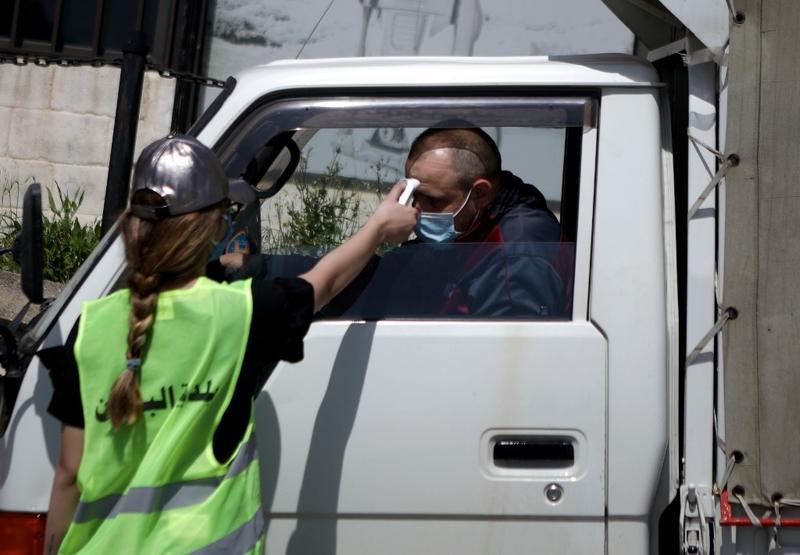 A municipality employee checks the temperature of a driver at a checkpoint in Lebanon's northern coastal city of Batroun on April 4, 2020. (PATRICK BAZ / AFP)
A municipality employee checks the temperature of a driver at a checkpoint in Lebanon's northern coastal city of Batroun on April 4, 2020. (PATRICK BAZ / AFP)
BEIRUT — The raging coronavirus pandemic is set to have grave impacts in Lebanon as the country is struggling to end a long period of social instability, economic difficulties and political paralysis, Lebanese experts said.
Before the outbreak of COVID-19, Lebanon just managed to form a new government, which was expected to end a protracted political crisis caused by the massive protests and a political vacuum left after the May 2018 elections, due to the deep rifts among the parties.
Lebanese experts are now worried that the worsening living condition in Lebanon caused by the pandemic could renew social or political instability. As of Tuesday, the total number of novel coronavirus infections in Lebanon rose to 548, while the death toll stood at 19.
We may, for instance, witness great changes in the outcomes of Parliamentary elections in 2022, which could elect a political class that can better cater to people's needs
Andre Abou Maachar, CEO of the National Security Forum
ALSO READ: France pledges to help if Lebanon needs financial aid
Andre Abou Maachar, CEO of the National Security Forum, said that many Lebanese families' financial conditions have further deteriorated after the outbreak of the pandemic as many have lost their jobs.
He said that those who have nothing to lose could go to the streets to renew protests once the pandemic slow down, but adding that the protests may also take different forms as people have become highly aware about the health risks of public gatherings.
"We may, for instance, witness great changes in the outcomes of Parliamentary elections in 2022, which could elect a political class that can better cater to people's needs," Abou Maachar.
Lebanon had witnessed, starting from Oct. 17, 2019, massive nationwide protests against the political system, which caused paralysis in various sectors and economic deterioration as demonstrated by price hikes and a shortage of foreign currency reserves.
The Lebanese Consumers' Association said early the month that the prices of food products and services had surged by 58.43 percent since October 2019, as the importers had to buy U.S. dollars at higher exchange rate amid the shortage.
On Jan 21, a new government led by Prime Minister Hassan Diab was created to end the political stalemate, offering a hope for return to normal life in Lebanon.
However, only one month late, the first case of COVID-19 infection was reported in Lebanon. The Lebanese government has since imposed strict measures to curb the virus spread, including imposing strict travel bans and closure of some businesses, which led to the loss of jobs of many breadwinners.
The Syndicate of Hotel Owners in Lebanon said in late March that 17,000 employees in Lebanese hotels have lost their jobs due to the economic slowdown and COVID-19 outbreak.
Wassef Harakeh, an activist and lawyer who works with the People's Observatory Against Corruption in Beirut, said this pandemic has increased the Lebanese awareness about "the need for a political class that can offer more effective policies in public sectors such as a strong public health system. "
Some Lebanese lamented the government's earlier decision to allow in the flights from some infected countries, such as Iran and Italy, without testing the passengers for the virus.
But the Lebanese government has been trying its best to take tough measures to stem the spread of the pandemic. Lately, it also decided to bring home Lebanese expats from the infected countries and test them for COVID-19 upon arrival in Beirut.
Diab recently said that his government has been working day and night to face the unexpected challenge of COVID-19, while promising to work hard to restore confidence in the Lebanese political system.
READ MORE: Crisis-hit Lebanon on brink of forming new government
In this context, the government approved recently a social support program for the most vulnerable population by offering 400,000 Lebanese pounds (about US$270) per family to support them during this difficult time.
Still, some experts expressed concerns about "a social explosion after the virus subsides given people's dire living conditions."
"If people become desperate about their situation, they will definitely take their anger to the streets even if they still fear COVID-19," said Hilal Khashan, chair of the Political Studies Department at the American University of Beirut.
But, he added, the government will not help much because it has other problems to deal with amid the shortage of foreign currency reserves and the need to restructure its debts.
"What politicians will do then is to ask people to help each other to survive because the cabinet does not have any solutions for the time being," Khashan said.


